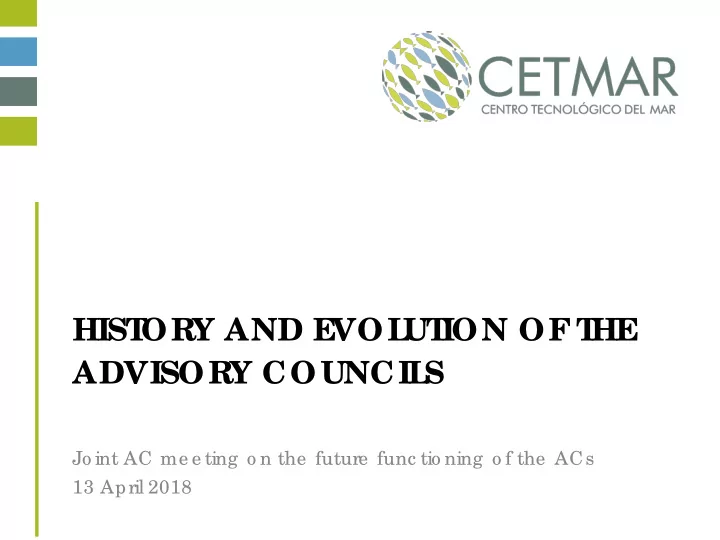

HIST ORY AND E VOL UT ION OF T HE ADVISORY COUNCIL S Jo int AC me e ting o n the future func tio ning o f the ACs 13 April 2018
• De ve lo pme nt o f the Adviso ry Co unc ils Before Now Next
PATH DEPENDENCY GOVERNANCE Who decides what How decisions are made
• What is the underlying question that comes to your mind when you see this topic on the agenda? Question by Stefan Baudy licensed under CC BY 2.0
Before Now Next Informal Regional Workshops CFP Reform EEZs 1971 1977 1983 1992 1994 1997 1999 2000 Commission Council Regulation PECH Action Plan CFP closer dialogue Committee for closer with the fishing in the EP dialogue sector and groups ACF with the affected by the fishing common fisheries industry policy ACFA (+NGOs)
Adapted from Burns and Stöhr (2011)
Before Now Next Common Framework (R)ACs Council Decision 2004/585/EC MEDAC BSAC 2008 2002 2004 2005 2006 2007 2008 2001 Assessment Advisory Councils NSAC NWWAC LDAC Green (ACFA + RACs) SWWAC PELAC Book CFP Reform From DG FISH to DG MARE Aim of European MSFD General interest RACs 2007/409/EC
Burns and Stöhr (2011)
Challenges Functions: • Launching and managing • To provide advice to the expectations Commission • Lack of common understanding : • to channel information definition of “the problem” and between local stakeholders and the “solution”. Highly time- policymakers consuming work to get a shared • to react to proposed policy and view. to create advice proactively • Consensus: radical change from • To provide fora for improving previous CFP contexts. mutual understanding • Cleavages: national fisheries • to work deliberatively, and sectors, industry –NGOs, etc. consensually : advice must • Lack of trust and dominance of reflect compromise. self-evident trues • To be inclusive, transparent • Ambiguity of the processes and and accountable, supporting learning-by-doing. also other EU policies
From MS shall provide (art. 7 2004/585/EC Council ) to MS may provide Before Now Next (art. 7 2015/242 Commission Delegated act) the appropriate support to the Regional Advisory Councils Commission delegated Act on ACs functioning. Small-scale fisheries BlSAC 2013 2014 2015 2009 2016 MoU EU- ICES MAC AAC Scheveningen CFP Reform EU- Increased financial Group of MS contribution 20% (2004) BALTFISH 11 ACs (R) 60/40 (Parliament 50/50) Process: rationale and timelines Regionalization OMR (not set up yet) Landing obligation MMSMP Discontinuation of the ACFA
Ramirez et al ( forthcoming )
ACs assessment Who When How Griffin 2004-2006 50 interviews (NSAC) European Commission 2008 7 Secretariats and Member States Ounanian and Hegland 2009 (2012) 138 individual participants Hatchard and Gray 2002-2008 (2014) 103 interviews (NSAC) Selke and Dreyer 2010 15 interviews (BSAC) Pascal Baelde 2011 30 interviews. Audit functioning SWWAC Linke and Jentoft 2008-2015 27 interviews (BSAC) Eliasen et al. 2014 7 key informants interviews. 16 on-line survey
ACs Learning curve Peak of expectative Heavier workload Process legitimacy Opportunity Frustration Disillusionment Risk: prolonged pattern of no perceived influence 2004 2007 2009 2013 2018
What is at stake? Crossroads by Tawheed Manzoor licensed under CC BY 2.0
How to ensure the ACs’ robustness • ACs internal functioning • CFP governance system
ACs functioning • Tension between external effectiveness and internal democracy • Representativeness: allocating “stakeholderness” and constituency issues. • Rules of the game : practical procedures for participation and communication. How members are allowed to provide input, how power relations are structured and how negotiation and communication between involved parties evolves during and between meetings.
The NGOs -industry cleavage • ACs should provide balanced arbitration to determine what is rational and acceptable (value-ladden). • robustly justify their assertions in the context of publicly held values (Jentoft and Mikalsena, 2001). • Evidences: comercial interests ≠ unsustainable policies
Proposals • Administrative and logistical burdens: resources and flexibility. Multi-annual budget? • Free-riders: Commitment. Positive/negative incentives? • Capacity building: participation and team building • Quality advice: Annual de-briefing with ACs to discuss the follow-up of their advice? • Reputation: Communication trainees? • Scoping: marine and maritime affairs. Umbrella organizations?
Advisory system Able to feed their knowledge into the system before the science has been incorporated into management proposals (Rice, 2005; Linke et al. 2011) Ballesteros et al. (2017)
Regionalisation Eliasen et al. (2015: 228)
Current regionalisation • Gradual process (EC) • Hampering the ACs position in the • De facto enables governance system. hierarchical decision making vs. pluralistic • At odds with the participatory supra and sub- processes. regional scopes
Proposals • Current design • Polycentric governance – ACs: active observers in the MS RGs. MS are not decision-makers at that governance tier. – Setting processes to ensure transparency and accountability – ACs as channel for all stakeholders (RSC, civil society, etc.)
Polycentric governance Supraregional 1. Delegated power (s) 3. Adopted delegated Council and Commission regulation (s) Parliament 2. Request for Advice recommendations (s) MS ACs Regional Subregional
Brexit Brexit by Mick Baker licensed under CC BY 2.0
An opportunity to use the European added value of the ACs : – Now : to monitor and respond to the progress of negotiations, facilitating also scientist communication and input. – During the transition period : UK government would not be part of the decision-making process. The ACs concerned may readjust their structure to allow for consultations and joint discussions at stakeholder level
• In the new institutional arrangement : dual nature as Advisory Council within the EU and integrated as Regional Stakeholder Organization(s) (EU-UK-Norway¿?). • Test the robustness of the stakeholder cooperation in the area.
What about your underlying question for the history of the ACs? Thank you for your attention mballesteros@cetmar.org
Recommend
More recommend